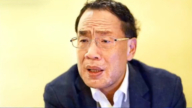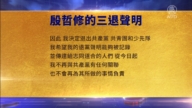【新唐人2011年4月15日讯】国际民意调查公司GlobeScan针对全球25个国家1万2千人,进行“自由市场经济是不是世界经济最理想的模式”的问卷调查,结果显示,中国人对“资本主义体制”的支持率高达67%。学者专家指出,尽管中共当局坚持所谓的“中国特色社会主义”,实际上,中国已蜕变为“共产权贵资本主义”。
调查结果显示,25个国家对“资本主义”的平均支持率为54%。对“资本主义”最为积极的是德国,支持率达68%。这对产生于德国的“马克思共产主义”是一个极大的讽刺。
中国人对“资本主义”的支持率达67%,比前一年略有增加,自2005年以后,在5年内超过美国。巴西支持率为67%、肯尼亚61%、菲律宾65%,这些新兴国家对资本主义体制表现出高度信任。
而美国人对资本主义的支持率从2009年的74%,减到2010年的59%。英国人的支持率为55%、西班牙52%;特别是,法国的反资本主义情绪最高,支持率仅为31%。
英国《经济学家》周刊报导说:“负债增加”和“产量减少”是全球金融危机的最大后遗症;但对资本主义的信任危机,可能会是更为严重的后遗症。
外界分析指出,发达国家的高税收、高福利,以及政府庞大的财政赤字,违背了资本主义的自由市场经济原则,全球金融危机正是由此造成的恶果。
十八世纪英国杰出的经济学家和哲学家亚当•斯密,被称为“现代经济学鼻祖”,他所着的《国富论》奠定了“资本主义自由经济”的理论基础。
史东(时政评论员):“在这部著作中,亚当•斯密认为追求个人的经济利益是人性中最自然的一部分。一个人在自己的致富发财的同时,也在促进全社会的福利和进步。而经济进步、国富民肥的唯一办法,就是尽量减少国家政权对私人经济活动的任何干涉。因为最好的经济活动都是由潜在和强大的市场机制来调节的。”
苏联、东欧和中国都证实了消灭私有制的“社会主义”违背人性,因而彻底失败。中共政府自改革开放以来,开始从濒临崩溃的“计划经济”向“市场经济”改革。但西方国家至今都不承认中国是市场经济地位的国家,国际普遍认为中国是一党专政的“共产权贵资本主义”。
魏京生(流亡美国的中国民主人士):“这些所谓的改革就是掏穷人的腰包制造一批先富起来的人,他们富起来的方法就是巧妙的共别人的产,能共别人的产的条件,就是他们掌握着不讲理的独裁政权。”
在今年北京“两会”上,中共人大委员长吴邦国高调重申:坚持中国特色社会主义道路,不搞多党轮流执政,不搞指导思想多元化,不搞三权鼎立,不搞私有化。
胡平(《北京之春》杂志主编):“与此同时,中共又深知,无论它们的权力看上去多么强大,骨子里却是十分脆弱的,因为它完全是建立在不间断的压迫之上,一旦压迫机器失灵,庞大的专制权力就会顷刻瓦解。”
目前,在大纪元退党网站上公开退出中共党、团、队组织的人数,已经超过9300万。民意调查结果,67%的中国人支持资本主义体制,再次证实:随着退党大潮的推进,越来越多的中国人唾弃共产主义和共产党,走向精神觉醒。
新唐人记者李元翰、萧宇综合报导。
=====
67% of Chinese Support Capitalism
GlobeScan, an international public opinion company,
polled 12,000 people in 25 countries on whether
free market is the best model for world economy.
Results showed 67% of Chinese support capitalism.
Experts pointed out that although the CCP
(Chinese Communist Party) insists on the so-called
‘socialism with Chinese characteristics’,
China has already degenerated
into‘ capitalism with communist elite.’
The survey showed the average support rate for
capitalism was 54% among these 25 countries.
Germany has the highest support rate of 68%.
This is a great irony to the Marxist communism
originating from Germany.
The Chinese support rate increased slightly this year
to 67% compared to last year. China’s support rate
has been higher than that of the U.S. since 2005.
Brazil’s rate is 67%, Kenya 61%, Philippines 65%.
They all show a high confidence in capitalism.
The rate of the U.S. decreased from 74% in 2009 to
59% in 2010. The British rate is 55%, Spain 52%.
France has the highest anti-capitalism sentiment,
having a support rate of only 31%.
The British Economist ,reported that the increased
liability and reduced production are
the biggest aftermath of the global financial crisis.
However, diffidence in capitalism
may be a more serious aftermath.
Analysts pointed out, high taxation, high welfare,
and high government deficit in developed countries
violated capitalist free market economy principles,
causing the result of a global financial crisis.
Adam Smith, a British 18th century economist,
known as the father of modern economics, wrote
the book “The Wealth of Nations"
that founded free capitalist economy.
that pursuing individual economic interests
is the most natural part of humanity. A wealthy man
can benefit the welfare and progress of the society.
The only way to economic progress
and people’s wealth is to reduce the interference
of the regime with private economic activities.
The best economic activity is one that is regulated
by a strong market mechanism.
USSR, Eastern Europe and China have all showed
that socialism is an anti-private concept and against
human nature. With the opening-up policy, the CCP
changed from the nearly collapsed planned economy
to market economy. But up to date, the Western
countries still do not recognize China as a market
economy, because China is still under one-party
dictatorship and a “capitalism with communist elite."
Wei Jingsheng, a Chinese democracy activist exiling
in the U.S, said: “The so-called reform generates
a group of rich people ahead of others by taking
the wealth from the rest of the people. Why is that
the regime is able to do that? Because they are
a despotic regime ruling with violence."
During the CCP’s last ‘two meetings’ chairman of
National People’s Congress, Wu Bangguo reiterated
to stick to socialism, with no multiparty system,
no diversified ideology, no 3 powers separation
and no privatization.
Hu Ping, Editor-in-Chief, Beijing’ Spring magazine:
“The CCP knows that no matter how strong it looks,
the regime is very fragile because it is entirely built
on continued suppression. Once the state organs
malfunction, the regime will instantly collapse."
So far, over 93 million people have quitted the CCP
and its affiliated organizations. A survey showed
that 67% of Chinese people support capitalism,
which indicated more and more people
are awakening spiritually amidst the party-quitting
waves and spurn the communism and the CCP.
NTD reporters Li Yuanhan and Xiao Yu.






























